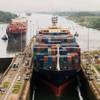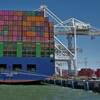Clean Air Action Plan Air Quality Award Winners Announced
The Ports of Los Angeles and Long Beach have selected seven local maritime and cargo companies as this year’s recipients of the Clean Air Action Plan Air Quality Awards, an honor presented to those taking extraordinary measures to cut air emissions, modernize facilities and implement innovative operations to reduce air pollution.
“These partners have shown a real commitment to cleaner and greener port operations, going above and beyond what is required,” said Port of Los Angeles Executive Director Geraldine Knatz, Ph.D. “These awards highlight what can be achieved when entities join forces and embrace innovation to better the environment.”
“The Clean Air Action Plan awards are a fantastic way to put a spotlight on the oftentimes unheralded efforts of the goods movement industry to meet and exceed air quality goals, and to invent a better way to cleaner air for everyone,” said Port of Long Beach Executive Director Richard D. Steinke. “We congratulate all of the winners.”
Now in their fourth year, the annual Air Quality Awards were initiated shortly after the Ports of Los Angeles and Long Beach approved the landmark San Pedro Bay Ports Clean Air Action Plan in 2006.
Port tenants and other organizations that serve the ports are eligible to be nominated. The judging panel includes port staff, as well as representatives from the South Coast Air Quality Management District, California Air Resources Board and the U.S. Environmental Protection Agency.
This year’s awardees fall into three categories:
Air Quality Improvement Leadership at the Corporate Level
· Clean Truck Coalition, LLC
This group of 10 family-owned licensed motor carriers was formed in 2008 as a direct result of the ports’ Clean Air Action Plan and Clean Truck Programs. Taking the lead in improving air quality at the San Pedro Bay Ports and beyond, the Clean Truck Coalition created a partnership and “pooling agreement” that required its members to share information to better utilize their collective truck fleets. Such measures included operating more vehicles at night to reduce traffic congestion and sharing equipment to reduce container-less truck trips back to the ports. The CTC also invested $109 million in new equipment, including nearly 1,000 new diesel and liquefied natural gas trucks, which represent about 11 percent of all new trucks at the San Pedro Bay Port complex.
· Ability/Tri-Modal Transportation Services Inc.
Ability/Tri-Modal is a third-generation, privately-held trucking, warehousing and distribution company that serves both ports. Over the last two years, the company has replaced its entire fleet of 51 drayage trucks with port-certified clean trucks, resulting in significant emission reductions. Active in various environmentally-focused initiatives, including the EPA SmartWay program – a voluntary federal initiative that encourages environmentally cleaner, more fuel-efficient transportation options – Ability/Tri-Modal has also been a key participant in port efforts to reduce gate congestion, terminal queue times and truck idling, all important emission reduction measures.
· Evergreen Line
Evergreen Line, the ocean containership division of Taiwan's Evergreen Group, has an established reputation for environmental stewardship. In 2003, the company incorporated new S-type “Greenships” into its fleet, vessels that include low-sulfur fuel systems that reduce SOx emissions and efficient hull designs that help lower fuel consumption. These ships are also equipped to participate in the Port of Los Angeles' Alternative Maritime Power (AMP) program, which allows ships to plug into shore-side electric power while at berth, rather than running diesel engines while docked. Since 2001, Evergreen Line has also participated in the Port of Los Angeles' Vessel Speed Reduction program, in which vessels voluntarily reduce speeds to lower emission output. Environmental leadership has been a company policy since its founding in 1968.
Innovative Operations that Improve Air Quality
· Hamburg Süd
International shipping company Hamburg Süd has participated in the Port of Long Beach’s Green Flag program, a voluntary vessel speed-reduction initiative in which vessels slow down as far as 40 nautical miles outside of port. By slowing down, ships reduce the emission of pollutants into the air. In 2010, 99 percent of Hamburg Süd’s ships slowed down within 40 nautical miles, and 100 percent within 20 nautical miles, making it the Green Flag program leader among shipping lines frequently calling at the San Pedro Bay. Since 2008, Hamburg Süd has been named among the Port of Long Beach’s “best of the best” for compliance with vessel speed reduction.
· Yusen Terminals Inc.
A cargo terminal operator at the Port of Los Angeles, Yusen Terminals Inc. (YTI) voluntarily initiated a number of operational improvements to reduce emissions and increase efficiency. The company restructured its terminal traffic flow patterns to reduce the distance that trucks and workers need to travel to complete cargo pickups and drop-offs, and implemented a free-flow operation for all near-dock rail moves, significantly lessening turn times and truck idling within the terminal.
Nearly one third of cargo is now loaded directly onto rail cars at the terminal, which eliminates the need for transporting goods to other multi-user rail facilities located outside the port complex. YTI also automated its exit gate procedures to reduce truck queues and idling. Taken together, these measures have meant significantly fewer emissions and increased efficiency at YTI’s terminal.
Significant Early Action to Reduce Air Pollutant Emissions
· NYK Line
NYK Line is one of the largest vessel operators in the world. When the California Air Resources Board (CARB) approved a new regulation requiring that 50 percent of a company’s fleet by 2014 use clean, alternative shore-side power while at berth, NYK voluntarily elected to meet CARB’s optional, more accelerated compliance schedule that started in 2010, four years earlier than required. Though only mandated to meet a 10 percent compliance rate for 2010, NYK far exceeded that target, more than doubling its required compliance rate to 24 percent and reducing NOx emissions by 15.5 tons overall, in addition to other pollutants.
· Sause Bros.
Sause Bros. provides marine transportation and ocean towing services at the ports of Los Angeles and Long Beach. One of its primary clients is OXY/THUMS, operator of the four man-made oilfield islands in the Long Beach Harbor. In partnership with OXY/THUMS, Sause Bros. took significant steps in 2010 to reduce emissions from its marine transportation operations, well before CARB requirements. In 2010, the company repowered five of its harbor vessels and replaced 17 engines with cleaner, lower-emission technology. The new cleaner-burning technology meant reduced air pollutants, less fuel consumption and ultimately, a cost savings to both companies.













